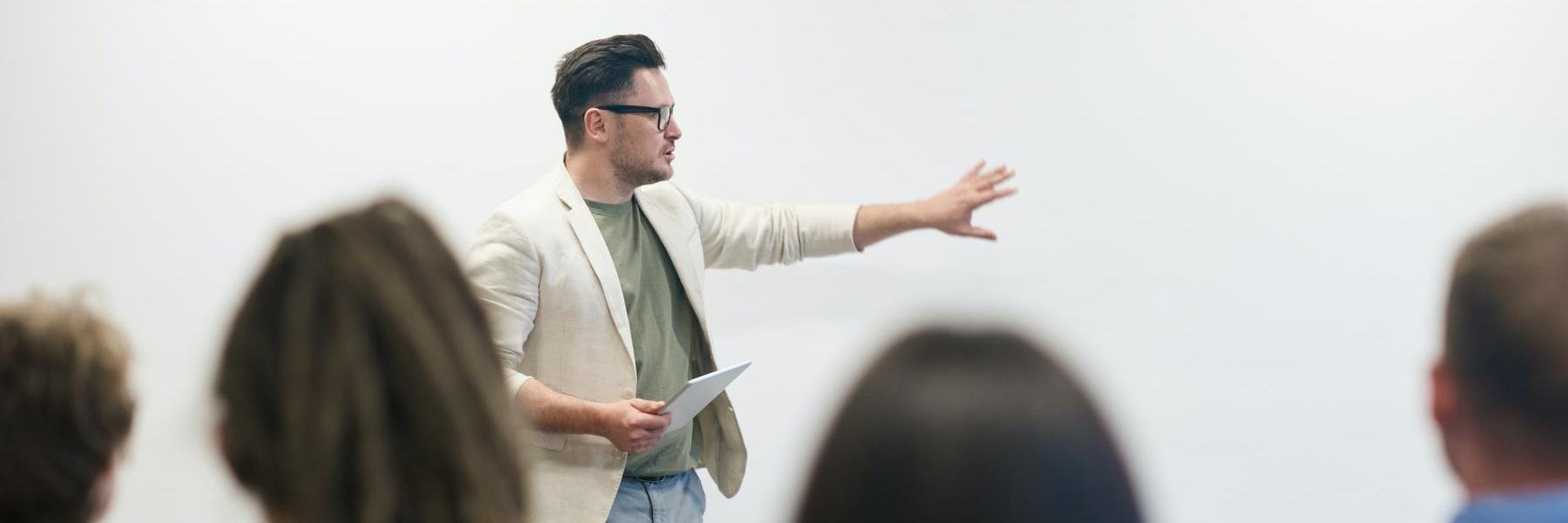Lectures, Workshops & Webinars
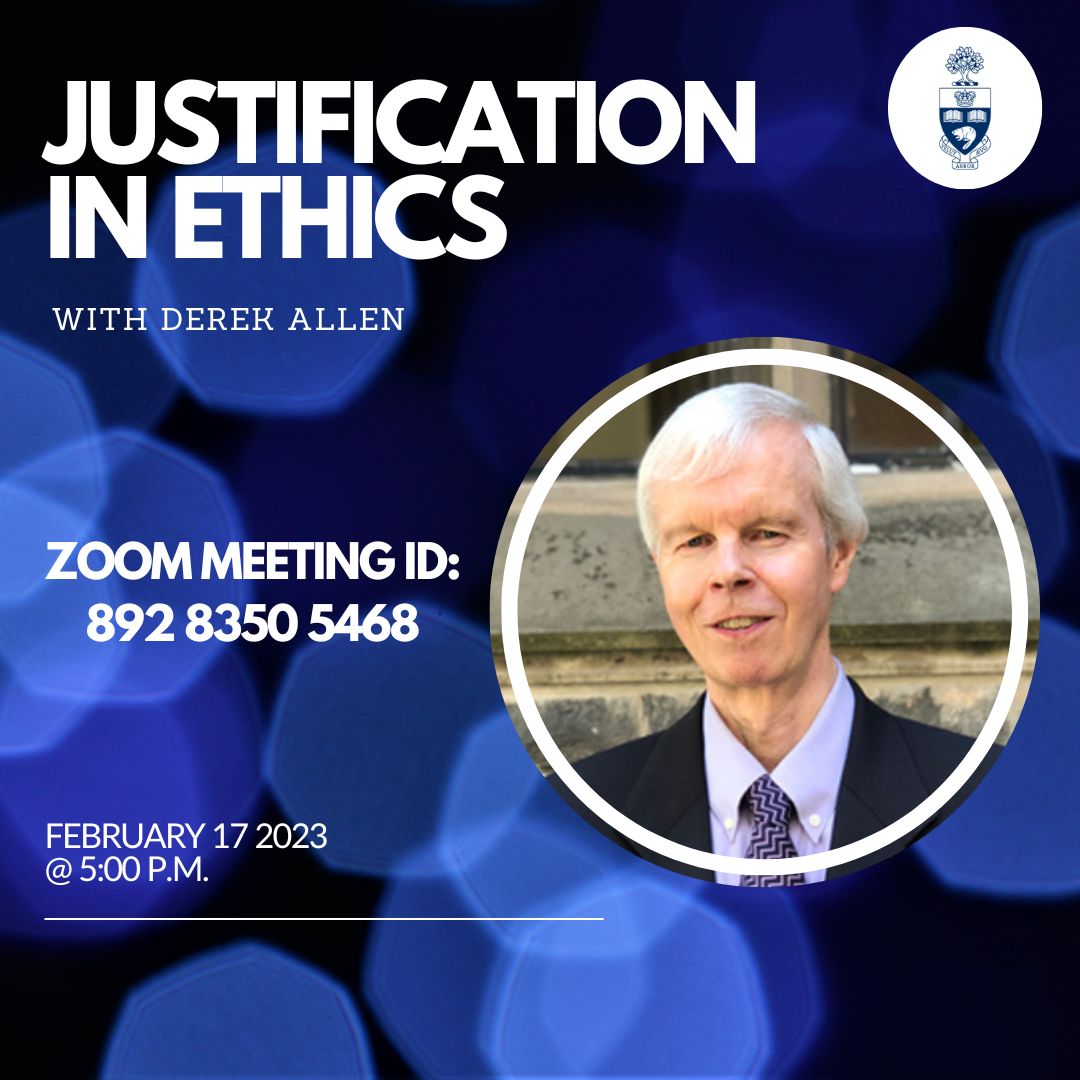
Justification in Ethics with Professor Derek Allen
The Association of Philosophy Students invites you to attend Professor Derek Allen's talk "Justification in Ethics" on Friday, February 17, 2023 @ 5:00 p.m. via Zoom.
Abstract: The issue I will be mainly concerned with in this paper is whether justification in ethics can be of the sort appropriate to knowledge and therefore epistemic. It can only if moral judgments can be true. I present a selection of views on whether there is truth in ethics and selected views on the nature of ethical justification. Ethical justification can be on-balance justification. I provide an example using an adaptation of a schema proposed by the philosopher Hans Hansen for balance-of-considerations arguments. I conclude with a suggestion for a non-epistemic account of justification in ethics.
All welcome.
👉 Register here: https://forms.gle/r9DXsMgF15wzm2NF9
👉 Join Zoom Meeting: https://utoronto.zoom.us/j/89283505468
Meeting ID: 892 8350 5468
Hope to see you there!
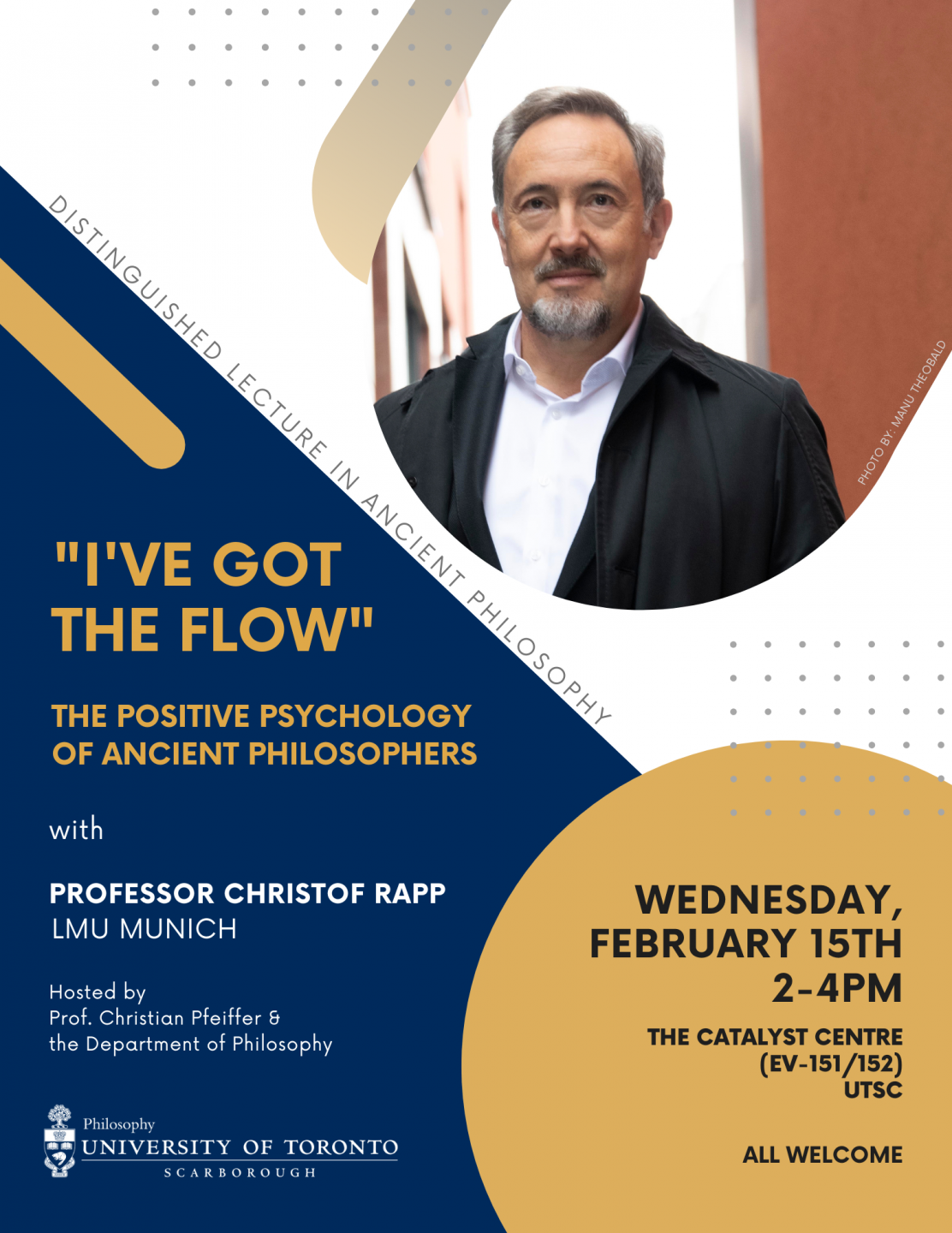
“I’ve Got the Flow”: The Positive Psychology of Ancient Philosophers with Professor Christof Rapp (LMU Munich)
When? Wednesday, February 15th, 2023 2-4pm
Where? The Catalyst Centre (EV-151/152), UTSC
Abstract: Positive psychology is a relatively new branch of cognitive-empirical psychology that inquires into phenomena such as well-being, happiness, positive emotions, engagement (incl. the so-called ‘flow’), accomplishment, meaning in life, character traits and positive relations. The attribute ‘positive’ is meant to indicate a major departure from the so far predominant pathology-centred (and in this sense ‘negative’) style of modern psychology. Applied positive psychology aims at bringing about behaviors that can lead to improved performance and a more satisfactory life. The presentation tries to show that, even though positive psychology is a recent development within scientific psychology, ancient Greek and Roman moral philosophers (i.e. philosophers who lived approximately 2,500 to 1,800 years ago) shared more or less the same goals, addressed the same core phenomena and ended up giving similar recommendations. If this so, the purported goal of applied positive psychology (namely bringing about behaviors that can lead to improved performance and a more satisfactory life) can, in principle, also be reached by studying the works of these ancient Greek and Roman philosophers.
All Welcome
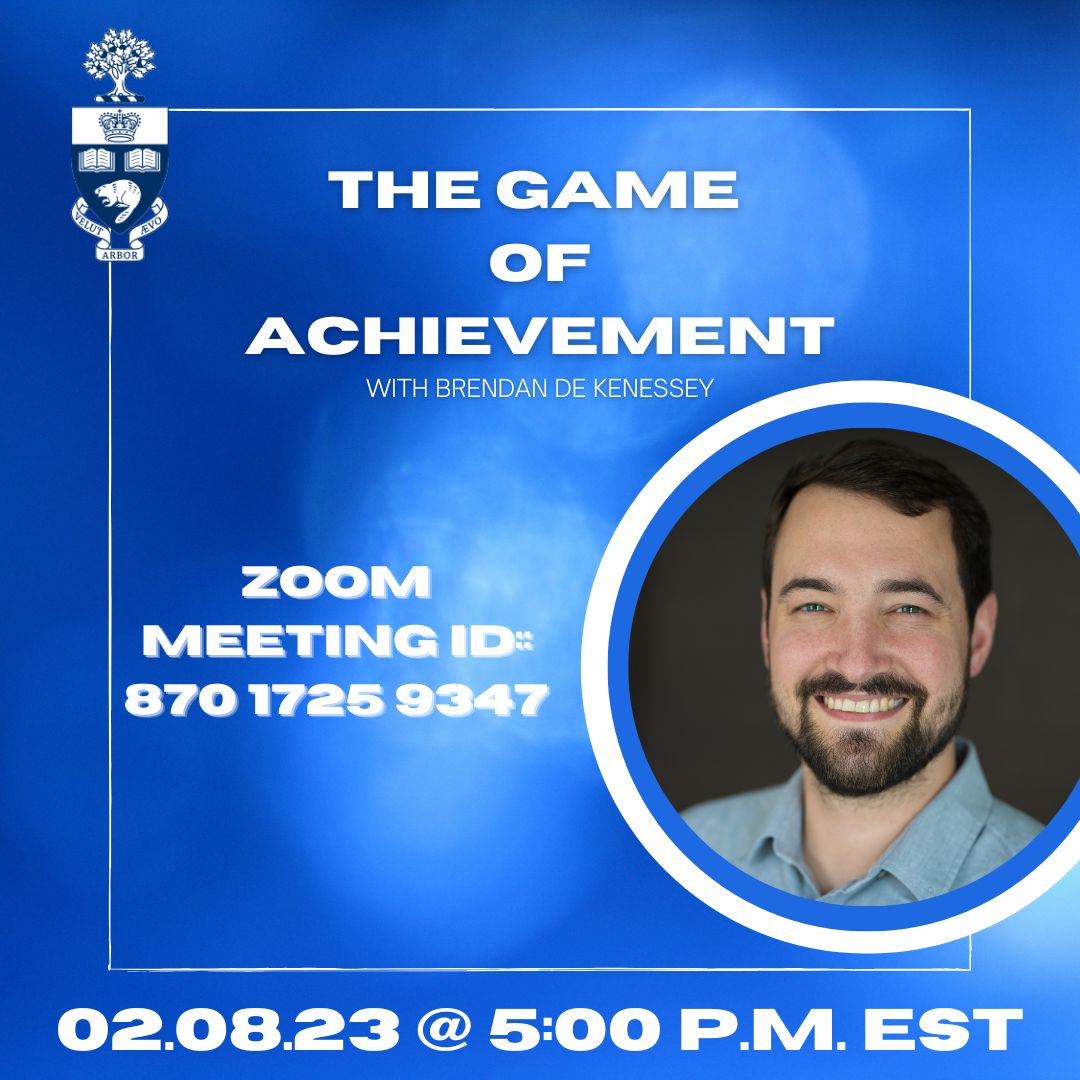
The Game of Achievement with Brendan de Kennessey
When? February 8, 2023 @5pm
Where? Zoom
Abstract: Many philosophers hold that achievement is an objective good, or part of what makes for a good life. On this view, the fact that a person has achieved something difficult or impressive contributes significantly to the goodness of that person’s life. I explore the idea that the value of achievement lies not in the achievement itself, but in the activity of pursuing the achievement. I draw on an analogy with games: to play and enjoy a game, one must take on the end of winning; but winning is not what gives a game its value. Instead, the value lies in the activity of playing itself. Similarly, I suggest that while many valuable activities require adopting achievement as an end, what makes the activity valuable is not that it ends in achievement, but rather the nature of the activity itself.
Join Zoom Meeting: https://utoronto.zoom.us/j/87017259347
Register here: https://forms.gle/oAC4KxhfqAXdC2mD8
All Welcome.
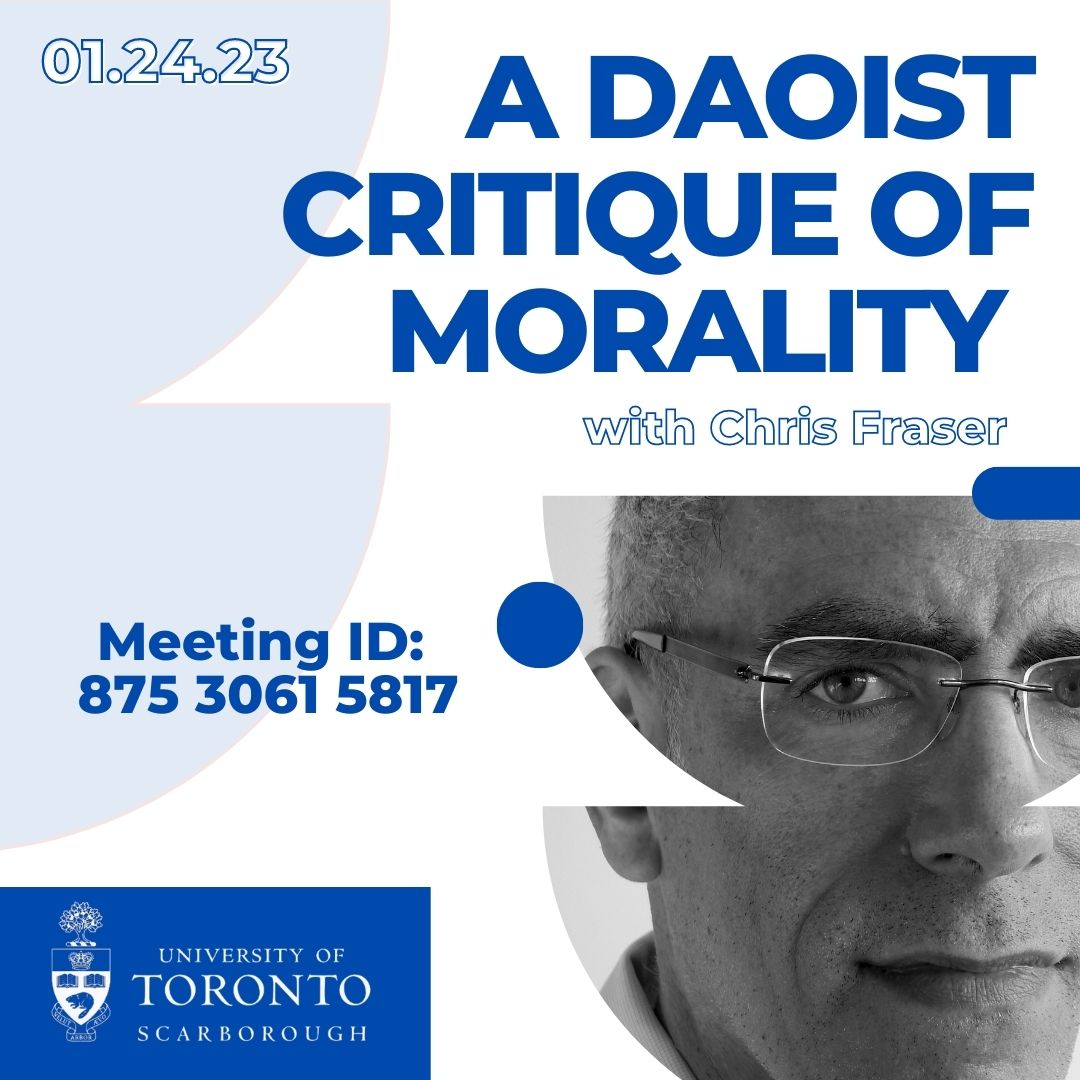
A Daoist Critique of Morality
When? January 26, 2023 @5pm
Where? Zoom
Abstract: A striking passage from the Daoist classic Zhuangzi likens devoting oneself to benevolence and duty and seeking to distinguish right from wrong to suffering the ancient Chinese corporal punishments of tattooing the convict’s face and amputating the nose. Common sense morality is not merely a mistake, the passage implies. It mutilates us, leaving us blind to the features by which to navigate the Way. This astonishing rejection not just of a particular understanding of morality but of the very idea of morality as a guide to action is representative of an intriguing thread of discourse that winds through several of the classical Chinese philosophical anthologies. According to this discourse, benevolence and duty obscure the Way and impair our ability to follow it. They are treated as pathological, as redundant, short-sighted measures that interfere with people’s spontaneous capacities and constitute obstacles to adroit action. This talk elucidates these themes, explains their significance in the context of early Chinese ethics, and relates them to ethical discourse today. I explain how, given early Daoists’ understanding of the structure of action and of the factors that guide it, their critique may be surprisingly plausible. I briefly situate the Daoist critique in relation to well-known ‘morality critics’ in the West, including contemporary writers such as Nagel, Wolf, and Williams and nineteenth-century figures such as Nietzsche and James. I then consider potential objections to the Daoist position and tentatively suggest how Daoist's might respond.
Join Zoom Meeting ID: 875 3061 5817
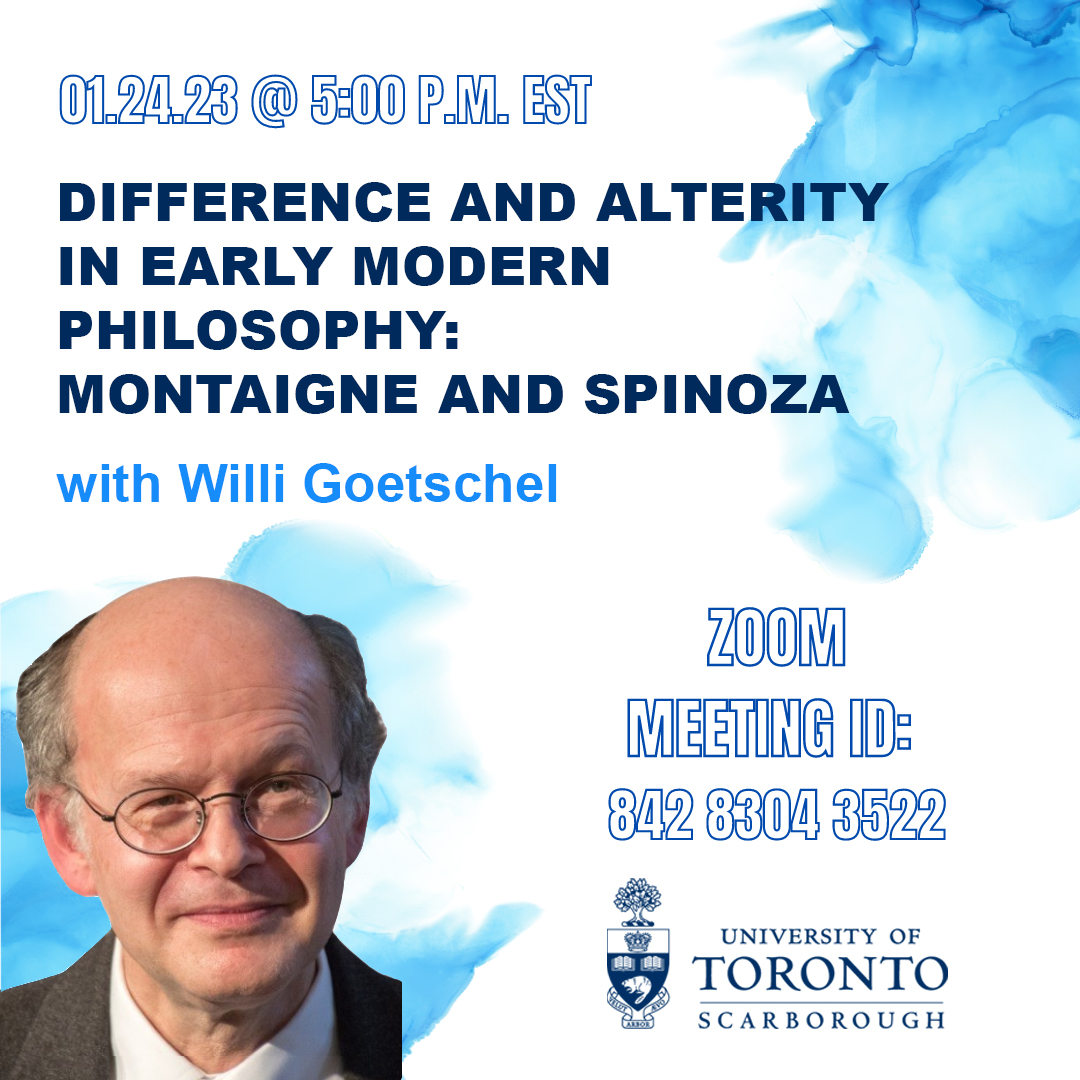
Difference and Alterity in Early Modern Philosophy: Montaigne and Spinoza
When? January 24, 2023 @5pm
Where? Zoom
Abstract: Upon closer examination we can see that in philosophy difference and alterity have not only more recently become issues of critical attention (at the latest with the beginning of the 20th century) but that they play a central critical role in the projects of philosophers in the early modern period. In Montaigne and Spinoza, for example, we can find a sustained interest in rethinking difference and alterity in ways that cast difference no longer as a deviation, deficiency or failure to fit concepts of identity and rationality. Instead, their projects reimagine philosophy in a way that embraces rather than polices difference and contradiction not only for moral but also for epistemological reasons. Both philosophers, in different ways, think through the significance of difference and alterity as a challenge to traditional forms of philosophy that necessitates a radical rethinking of the project of philosophy itself. As a result, Montaigne and Spinoza provide us with resources to reimagine difference as an emancipatory project. In other words, instead of mistaking difference and otherness as deviations from some perceived norm they accentuate the constitutive significance of affirming difference and otherness for a more thorough understanding of selfhood and identity.
Join Zoom Meeting ID: https://utoronto.zoom.us/j/84283043522
Register here: https://forms.gle/tJzHsfhm1uD2YJXU6
All Welcome.
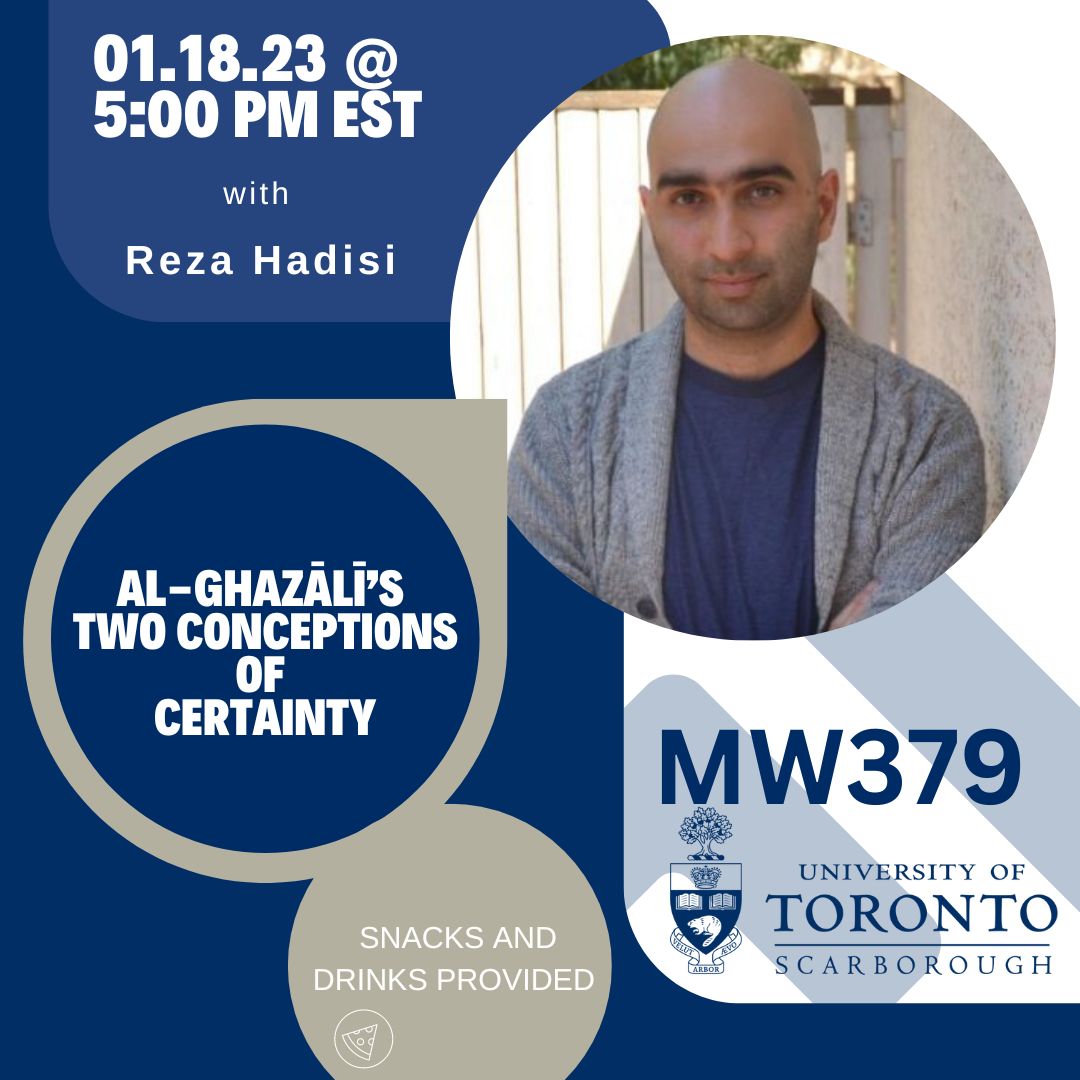
Al-Ghazālī’s Two Conceptions of Certainty" with U of T's Assistant Professor, Reza Hadisi
When? Wed, Jan 18, 2023 @5:00 p.m.
Where? MW379 (Seminar Room in the Philosophy Department)
Abstract: In his Deliverance from Error, Al-Ghazālī (1058-1111) offers an argument for global skepticism, i.e., the view that none of our beliefs amount to knowledge. However, his response to this skeptical argument appears abrupt and merely fideist. He writes: “At length God Most High cured me of that sickness. My soul regained its health and equilibrium and once again I accepted the self-evident data of reason and relied on them with safety and certainty.” In this talk, I propose that we can appreciate the philosophical significance of Ghazālī’s response to skepticism when we place it in the context of his views about different kinds of certainty. To do this, I look at Ghazālī’s magnum opus, the Revival of Religious Sciences. Along the way, we’ll talk about Ghazālī’s view that imagination can become a unique and fundamental source of knowledge.
Please fill out your information on the attendance sheet here: https://forms.gle/odA98edx1YFjJKVL7
Drinks and snacks will be provided.
All students welcome. We hope to see you there!
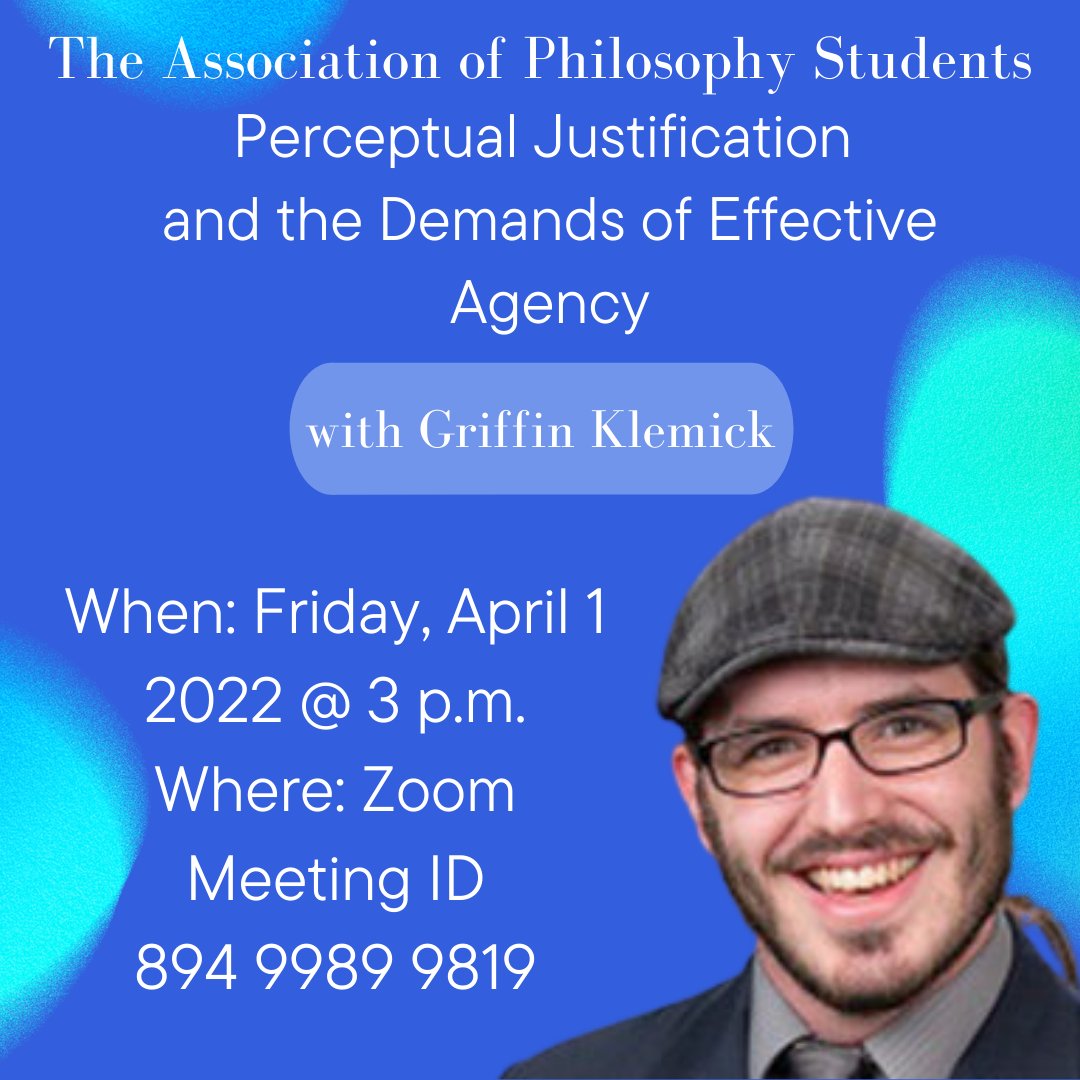
Perceptual Justification and the Demands of Effective Agency with Griffin Klemick
When? Friday April 1 @ 3pm
Where? Zoom (Meeting ID 894 9989 9819)
Abstract: If you're like me, when someone first posed a radical skeptical hypothesis to you, your first reaction was something like: "That's stupid; clearly I've got to trust my faculties if I'm going to, you know, live." And then you took a course in epistemology, and you were told that this is a shallow, naive, and inadequate response to skepticism, one that refuses to see the force of the problem. My claim in this talk is, in effect, that our first reaction was the right one. We do have strong reason to reject radical skeptical hypotheses, and this reason is practical rather than evidential. (If you aren't averse to spoilers, the reason is specifically that you need control over your empirical circumstances, and that you have a chance to meet that need only if you accept that your perceptual faculties are reliable.)
Sign up here:
https://docs.google.com/spreadsheets/d/1lQG7lycTDECPVyhjKtAXUOknu0wP1ebJmf_FTVmjWVA/edit#gid=0
Join Zoom Meeting
https://utoronto.zoom.us/j/89499899819
All welcome.
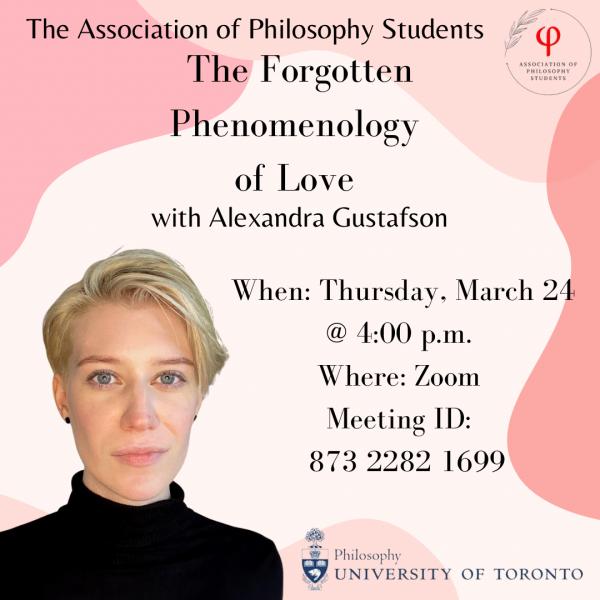
The Forgotten Phenomenology of Love with Alexandra Gustafson
When? March 24th @4pm
Where? Zoom (meeting ID 873 2282 1699)
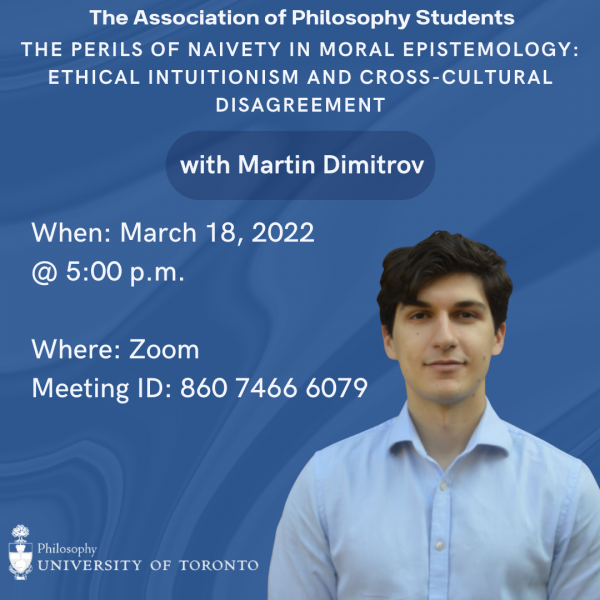
The Perils of Naivety in Moral Epistemology: Ethical Intuitionism and Cross-Cultural Disagreement with Martin Dimitrov
When? March 18, 2022 @5pm
Where? Zoom (meeting ID 860 7466 6079)
Abstract: Ethical intuitionism is a view in moral epistemology according to which the basic moral principles are self-evidently true. Ethical intuitionists like W. D. Ross and Robert Audi generate numerous deontological principles using this approach. I will argue that there is higher-order evidence about some of these supposedly self-evident moral propositions serves as a defeater for their self-evidence. Specifically, the fact that there is cross-cultural disagreement about some of the moral propositions we appraise as self-evident is evidence that the origin of these intuitions is epistemically untrustworthy. Since the moral philosophers who defend these claims often only support them through intuition, these claims are unjustified, and instead must be supported by argument.
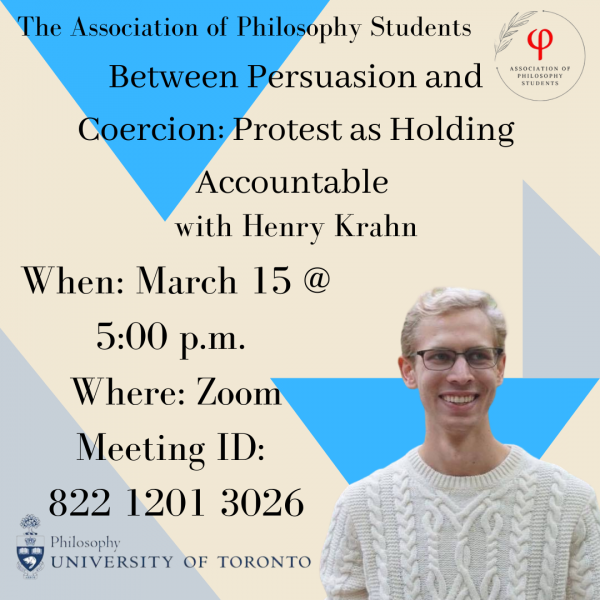
Between Persuasion and Coercion: Protest as Holding Accountable with Henry Krahn
When? March 15 @ 5pm
Where? Zoom (Meeting ID 822 1201 3026)
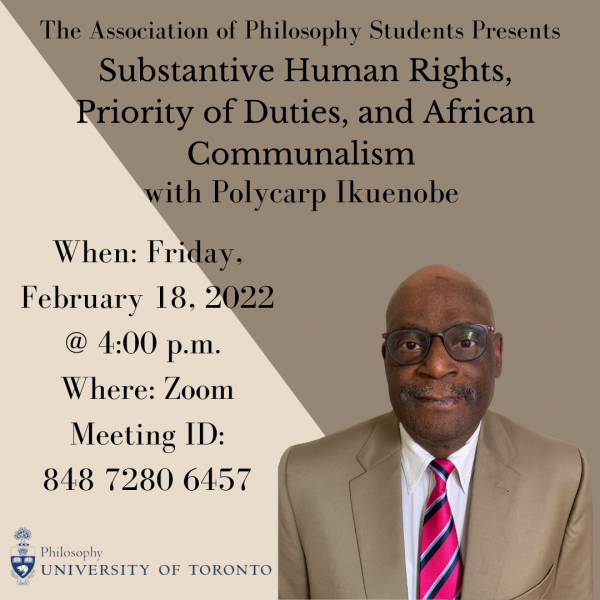
Substantive Human Rights, Priority of Duties, and African Communalism with Kent State University's Polycarp Ikuenobe
Abstract: "I argue for a plausible African idea and practice of substantive individual rights based on a communal system of the moral correlativity of rights and duties. This system specifies, (a) the priority of self-regarding and other-regarding duties, and, (b) the reciprocity of duties. These duties, which are a means of promoting general welfare and enhancing substantive rights and dignity, include perfect duties of non-interference that are engendered by rights. Communalism also emphasizes imperfect duties that do not necessarily correlate to rights, including supererogatory duties that are beyond the call of duty, and prima facie duties that can be overridden by different moral considerations. The ideas of priority and reciprocity of duties are exemplified in the social-communal nature of humans as implicated in African normative conception of 'personhood'. 'Personhood' involves an earned status that derives from, (a) human metaphysical capacities and, (b) social-moral recognition based on how properly these capacities are used in agency for moral excellence, by performing relevant duties."
Event organized by the Association of Philosophy Students.
All students welcome.
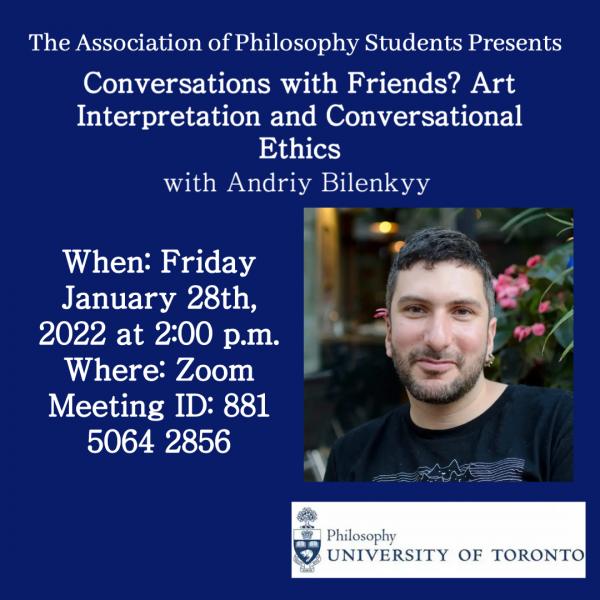
Conversations with Friends? Art Interpretations and Conversational Ethics with Andriy Bilenkyy
"Philosophers of art commonly believe that a characteristic feature of works of art is that they warrant interpretation. But what fixes the proper object of interpretation, how do we adjudicate interpretative disagreements, and are our interpretative activities subject to any ethical constraints? In this talk, we will explore the relationship between these questions, focusing on intentionalism, the view that the proper object of art interpretation is fixed by the intention of the artist. I will discuss recent attempts to defend this view by appeals to the ethics of conversational interpretation. I will argue that, on the contrary, conversational ethics suggests that some important properties of works of art — their aboutness-properties — are fixed not by the intention of the artist but by the ongoing and revocable tacit agreement between the artist and the audience."
Event organized by the Association of Philosophy Students.
All students welcome.
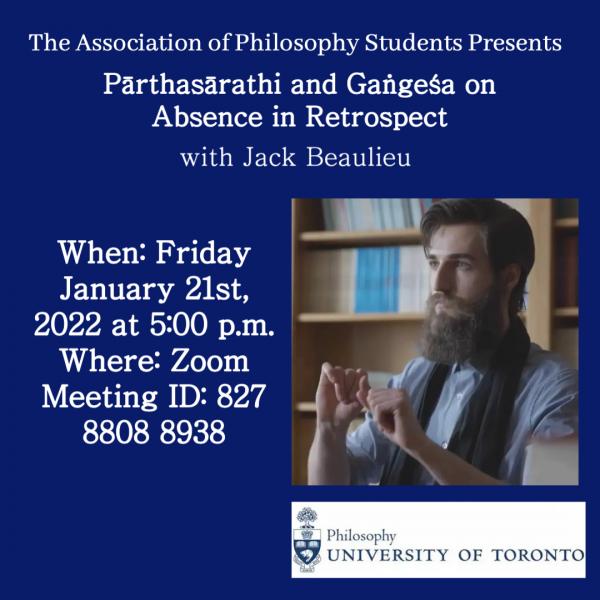
Pārthasārathi and Gaṅgeśa on Absence in Retrospect with Jack Beaulieu
"Cases of past absence (prāṅnâstitāsthala) involve agents noticing in retrospect that an object or property was absent, such as when one notices later that a colleague was not at a talk. Such cases pose substantive questions for the epistemology of absence: how is that we become aware that an object or property was previously absent, now that its absence is temporally and spatially distal? And in the process, do wegainknowledge that the object or property was absent? Or are we somehow recalling its absence, even though we did not take note of its absence at the time? We'll look at two competing views from the Sanskrit philosophical tradition about how agents learn of absence in retrospect: one from the 11th century Bhāṭṭa philosopher Pārthasārathi, and another from the 14th century Nyāya philosopher Gaṅgeśa, who raises a series of convincing objections to Pārthasārathi's view."
Event organized by the Association of Philosophy Students.
All students welcome.
Professor Sedivy gave a talk on "Wittgenstein, Plurality, and Context: Art as a Case Study" for the Twenty-Fifth British Wittgenstein Society Lecture Series on June 1, 2021.
Using Art as her example, Sedivy proposes that Wittgenstein’s later work suggests that we need to understand historically specific arts in their contexts and how this gives us just the outlook we need to understand art and art practices in their diversity.
The talk is accessible via the British Wittgenstein Society website here. Be sure to check it out.

b2B Career Night: Philosophy Careers in Bioethics – Thursday, April 29th 6:00-7:30pm
The Zoom Link is:
Join Zoom Meeting
https://utoronto.zoom.us/j/87800990504
Meeting ID: 878 0099 0504
Passcode: 639653
Our Panelists:
James Anderson – Bioethicist, Sick Kids Hospital
Eric Mathison – CEO, Canmore Ethics (Health Ethics Consulting); Clinical Ethicist, Alberta Health Services
Victoria Shelep – Coordinator, Research Ethics, Royal Victoria Regional Health Centre
The panel will be moderated by Professor Andrew Franklin-Hall and Maja Soltysiak (Philosophy Course Union Bioethics Liaison).
We hope to see you there!
.png)
Socrates Project Students Present Their Research
On April 28 & 30, Socrates Project students will be presenting some of the research they have been working on over the past year. Everyone is welcome to attend and discuss their projects with them!
April 28:
1:00 - 1:20 "Colonial Ressentiment: Fanon’s appropriation of Nietzsche”, Syed Ali
1:20 - 1:40 Q&A
1:40 - 1:50 Break
2:40 - 3:00 "The Axiology of Panpsychism", Marybel Menzies
3:00 - 3:20 Q&A
Zoom information for April 28 talks:
https://utoronto.zoom.us/j/88066202219
Meeting ID: 880 6620 2219
Passcode: 825844
April 30:
1:50 - 2:10 "Autonomy, Disability, and Assisted Dying", Joel Persaud
2:10 - 2:30 Q&A
2:30 - 2:40 Break
2:40 - 3:00 "An Umbrella Definition of the Act of Shaming", Zachary Tsang
3:00 - 3:20 Q&A
Zoom information for April 30 talks:
Link: https://utoronto.zoom.us/j/86252371593
Meeting ID: 862 5237 1593
Passcode: 596359
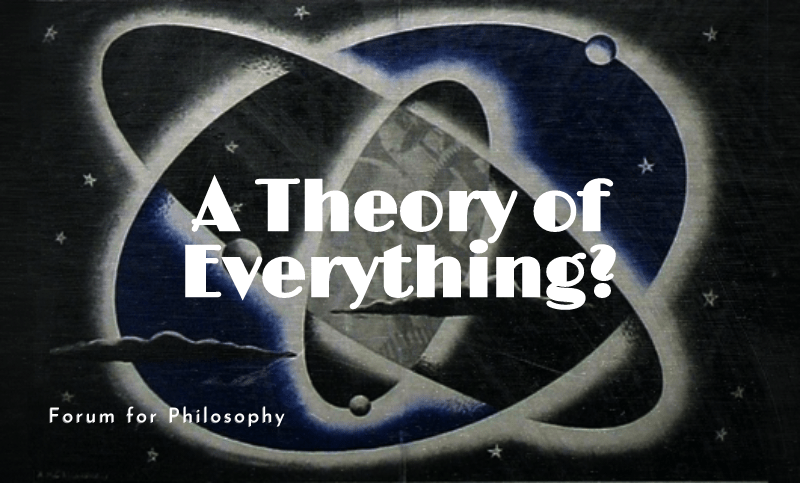
Our own, Dr. Jessica Wilson will be a panelist at the event, "A Theory of Everything?" organized by LSE's Forum for Philosophy
Date: Mar 23, 2021
Time: 2:00 - 3:15pm
Photo Credit: A. M. Cassandre, ‘Bijoux Modernes‘
The biologist Theodosius Dobzhansky wrote that nothing in biology makes sense except in the light of evolution. Is there an even more general theory that can make sense of all the sciences? The various scientific disciplines each have their own methods, theories, and practices. This is the case even when different sciences try to explain the same phenomena. Can we translate between these distinct disciplines? What does this even mean? Might all of science be reduced to physics one day? Panel to discuss reduction, emergence, and the unity of the sciences.
Speakers
Philip Ball
Science Writer and Editor, Nature
Vanessa Seifert
Postdoctoral Researcher, University of Bristol
Jessica Wilson
Professor of Philosophy, University of Toronto
For any queries, email events@lse.ac.uk
All Welcome.
Click here to register to join the Zoom webinar
https://blogs.lse.ac.uk/theforum/programme/a-theory-of-everything/
The Neurobiological Platform for Moral Behavior
Guest Lecture by Dr. Patricia Churchland (UCSD) - Mar 8, 2021
Mark your calendars! The Association of Philosophy Students is proudly hosting a talk by Dr. Patricia Churchland next week via Zoom. Dr. Churchland will be summarizing some of the main points of her recent book, Conscience: The Origin of Moral Intuition (2019, Norton Press).
Join us
Date: Monday, March 8th, 2021
Time: 12pm (EST)
Topic: The Neurobiological Platform for Moral Behavior
Zoom information:
https://utoronto.zoom.us/j/81692669131
Meeting ID: 816 9266 9131
Passcode: 971155
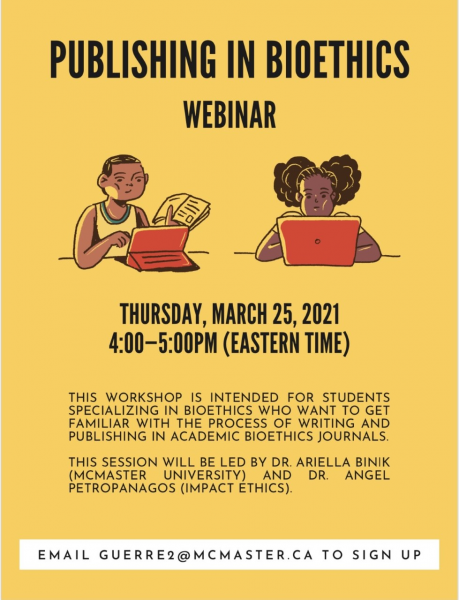
Attention Biomedical Ethics Students: Want to get familiar with the publishing process?
Join Dr. Ariella Binik (McMaster University) and Dr. Angel Petropanagos (Impact Ethics) on Thursday, March 25, 2021 from 4-5pm for an informative webinar.
Email guerre2@mcmaster.ca to register.
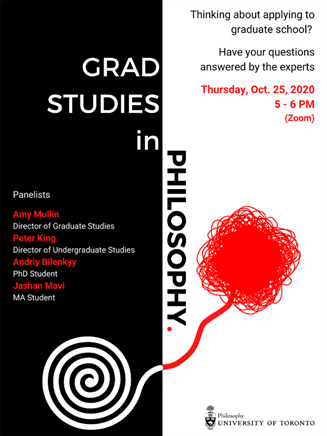
Considering grad school in Philosophy at U of T?
If so, join us on Thursday, Oct. 22nd from 5:00-6:00pm for our annual Applying to Grad School workshop. Our panelists for this event are:
-
Prof. Amy Mullin, Director of Graduate Studies
-
Prof. Peter King, Director of Undergraduate Studies
-
Andriy Bilenkyy, PhD Student
-
Jashan Mavi, MA Student
Please RSVP to eric.correia@utoronto.ca by Wednesday, Oct. 21st.
A Zoom link for the event will be sent to all student who RSVP.
